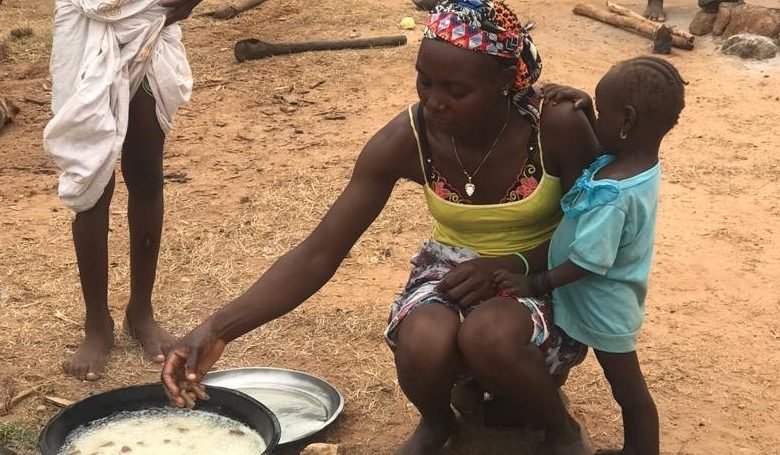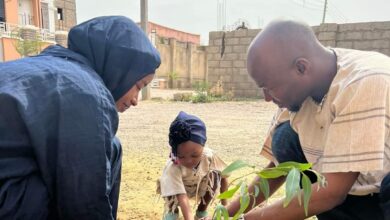Ripped By Militia Attacks, Shiroro Communities Lose Farming Season, Likely Facing Future Famine

The assailants invaded Kukoki community, one of the villages in Shiroro, Niger state, North Central Nigeria on Monday, June 15, 2020. Aisha, a local rice farmer and resident of Kukoki, was attacked, her husband killed that night by the militia. She spoke with HumAngle from her hospital bed in Kuta.
“They stormed my community in the night, my husband tried to escape but got killed along the way. They asked me to return to my house and cook food for them, they attempted to rape me but one elderly one among them insisted that nobody should touch me since I had cooked for them.”
“After some hours with them, I attempted to escape from them but they shot me in the leg, I don’t know where my children are now,” she lamented.
Shiroro Local Government Area described as the food basket of Niger State is known for the production of large scale yam, rice and cassava. It is also the location of Nigeria’s biggest hydroelectric power station.
In the last four years, the area has faced serious attacks from armed gangs, ranging from bandits, cattle rustlers and kidnappers.
The local government area is believed to be the epicentre of armed attacks in Niger State because of its strategic economic relevance plus its close proximity to Birnin Gwari Local Government Area of Kaduna State, also a hub of unwholesome terror attacks in recent weeks.
The attacks, which started way back in early 2015 with rural banditry, have become a serious humanitarian crisis as villages are sacked, farmlands destroyed, women raped, children forcibly orphaned and people kidnapped for ransom on a daily basis.
The armed conflict in the communities has destroyed family structures with many losing their assets and properties as a result of high demand for ransom from criminals. They also threaten food security as the attackers have warned farmers not to go to the farms or get killed.
“Kuta is a farming community. Our major source of livelihood is farming, we cultivate all manner of crops, especially yam, but we hardly cultivate now due to increasing insecurity,” Yusuf, a resident complained.
Bulus from Kwaki, another farming community, said “farming is very risky this year because all the farmers in my community are in the town now as internally displaced persons. We are all afraid. These people are deadly killers, we even received several messages from them warning us not to go near our farms if we really want to survive.
“The rainfall has already started, we are supposed to be in our farms now, and we do not know what will happen next year because most of our people are not going to their farms this year. Some of our people have left their communities and some relocated entirely from the state.”
Habiba, a rice farmer in Gurmana community, said “bandits told us, we should forget about farming this year.
“I think we have informants among us. They do sell out our plans to bandits. Anytime we plan to return to our communities, they will definitely attack us on our way back home or two days after we return. Even last week, they attacked us after we returned to our community, they killed three people, including my elder brother.”
Earlier in the month, Niger State Governor, Alhaji Abubakar Sani Bello, said the security agencies had been trying to deal with the situation but some saboteurs were selling out strategies of the security forces to the criminals. He said the issue of banditry in Shiroro and neighbouring communities was worrisome, especially as the area was known for farming which brought revenue to the state.
“This is a very serious challenge to us because the bandits are working with some highly placed members of the affected communities who give them vital information thereby aiding them from being tactically isolated and overrun.
“The state has been confronted with serial security threats in recent times and the government will not be deterred by the unpatriotic activities of such saboteurs but will do everything possible to bring an end to crime and criminality in the state,” Bello said.
He urged the people to support the government in the fight against crime by reporting those suspected to be involved in banditry and providing information to the security agencies to track and checkmate their activities.
“Right now, the people are returning because rainfall has started but they are taking so much risk. They cannot stay hungry here, but even at home they sleep on trees and in bushes,” said an IDP who pleaded not to be identified.
In Kita Community, the militia groups have promised not to allow them to farm and the people of Shiroro, Kagara, Miya and Rafi say there is a lot of laxity and negligence by the government.
For instance, a traditional ruler in Kuta expressed his frustrations about the situation to HumAngle, “the government is not doing enough to checkmate the activities of this criminal group. How can the government allow vigilantes alone to secure the community?”
“How can a person with a local rifle confront a person with an Ak47? The worst part of the issue is the government negligence to investigate where people are going after the attack. How many are displaced? Where are they now? How many are in IDPs camps?”
The ruler, who asked not to be named, said many “people relocated entirely from their communities to unknown places and the government doesn’t care to know where they are and in what conditions they are living.”
A vigilante from the Gijwa community said some people were sleeping on trees or in the bush. He said “the vigilantes are not properly equipped and they are overstretched. In fact, there was a scene when the vigilantes were attacking the militia gangs but a helicopter was providing cover for the gangs at the Gijwa community.”
“I am from Shiroro with relatives and friends from different communities, I cannot take myself to areas like Madallah, so we believe there’s a collaboration between the people and some people in our midst, in fact even in this IDPs camp. We arrested an informant from the Zungoru community of Bazakoki,” Habib, the Desk Officer of Gwada IDPs camp, said.
Yusuf, another resident said it was difficult to establish the true identity of the criminals, pointing out that “one strategy they have is just not to allow us to know who they are, no matter how bad, they will never leave a dead body behind.
“In the Gurmana attack, there was heavy exchange of fire, they were killed but they made sure to retrieve the dead and wounded, no matter what. They will pick them and put them in the middle on a bike or even in sacks.
“To these people they believe the Fulani are the key players while they blame their parents for hosting Fulani on their lands.
“It’s our parents’ fault, we allowed the Fulani here for too long, now we want to use our farmlands, it will become a problem.”
Cello, a Fulani man, who has lived in the Central School camp for long, expressed concern that many young Fulani people were joining the terror groups, saying, “they are easily corrupted by criminal groups from areas like Zamfara and Katsina. Once they are tempted with money they will join these gangs.”
Support Our Journalism
There are millions of ordinary people affected by conflict in Africa whose stories are missing in the mainstream media. HumAngle is determined to tell those challenging and under-reported stories, hoping that the people impacted by these conflicts will find the safety and security they deserve.
To ensure that we continue to provide public service coverage, we have a small favour to ask you. We want you to be part of our journalistic endeavour by contributing a token to us.
Your donation will further promote a robust, free, and independent media.
Donate Here




